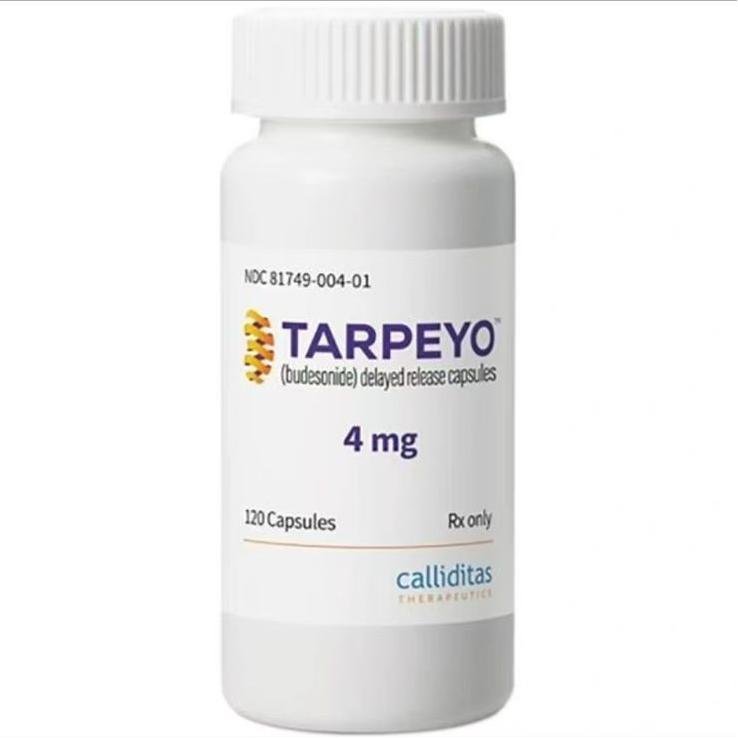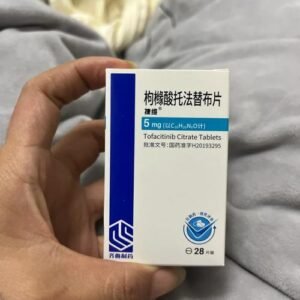budesonide 布地奈德胶囊
Budesonide extended-release capsules are a glucocorticoid drug primarily used to treat mild to moderately active ulcerative colitis and Crohn’s disease (affecting the ileum or ascending colon). They alleviate intestinal inflammation through local anti-inflammatory effects while utilizing sustained-release technology to minimize systemic side effects, making them a preferred intestinal-specific delivery method.
I. Indications and Mechanism of Action
Indications
Primarily used for the palliative treatment of active ulcerative colitis (affecting the rectum, sigmoid colon, or descending colon) and Crohn’s disease (affecting the ileum or ascending colon), they are particularly suitable for patients who have not responded adequately to traditional treatments or who require a reduction in systemic corticosteroid dosage.
Mechanism of Action
Budesonide is a highly potent local anti-inflammatory glucocorticoid that relieves intestinal mucosal edema and ulcers by inhibiting inflammatory cell migration and reducing the release of inflammatory mediators. Its extended-release formulation releases the drug in specific areas of the intestine (such as the ileum or colon), increasing local drug concentrations while reducing systemic absorption and lowering the risk of side effects such as adrenal suppression.
II. Usage and Dosage
Usual Dosage
Ulcerative Colitis: Typically, take 9 mg orally once daily (the specific dose should be adjusted based on the condition). It is recommended to take it in the morning on an empty stomach to align with the intestinal circadian rhythm.
Crohn’s Disease: The recommended dose is 9 mg/day. Treatment generally lasts no longer than 8 weeks, with subsequent adjustments based on symptoms or a switch to maintenance therapy.
Precautions
Swallow the tablet whole; do not chew or break it to avoid disrupting the extended-release structure.
Regularly monitor liver function, blood pressure, and bone density during treatment. Long-term use may increase the risk of osteoporosis.
III. Adverse Reactions and Contraindications
Common side effects include headache, nausea, bloating, and indigestion. Most symptoms are mild and reversible. Long-term or high-dose use may cause adrenal suppression, increased risk of infection (such as oral candidiasis), or skin bruising.
Contraindications
Individuals with allergies to budesonide or its excipients;
Active peptic ulcers or severe liver dysfunction;
Uncontrolled infectious diseases (such as tuberculosis or fungal infections).
IV. Use in Special Populations
Pregnant and Breastfeeding Women
Animal studies have shown that budesonide may affect fetal development; use should be carefully weighed against the risks. Caution should be exercised during breastfeeding to avoid effects on infants through breast milk.
Children and the Elderly
Children should strictly follow their doctor’s instructions when using this medication; long-term use may affect growth and development. Elderly people should be aware of the risk of osteoporosis and infection.
V. Interactions with Other Drugs
CYP3A4 inhibitors (such as ketoconazole and clarithromycin) may increase budesonide blood concentrations, necessitating dose adjustment.
Combined use with nonsteroidal anti-inflammatory drugs (NSAIDs) may worsen gastrointestinal irritation. VI. FAQs
Is it suitable for all intestinal inflammation?
It is only indicated for specific types of ulcerative colitis and Crohn’s disease and is not suitable for other intestinal diseases (such as infectious enteritis).
How long does it take for the effect to start?
Symptoms typically improve after 2-4 weeks of continuous use. If no relief occurs within 8 weeks, the treatment plan should be reevaluated.
How does it differ from conventional hormones?
Compared to systemic hormones such as prednisone, budesonide extended-release capsules have a stronger local effect and significantly fewer systemic side effects, making them suitable for patients requiring long-term inflammatory control.
Proper use of budesonide extended-release capsules requires careful consideration of individual medical conditions and strict adherence to doctor’s instructions. Avoid increasing or decreasing the dose or stopping the medication on your own to ensure efficacy and safety.
See more
Share:
Products
Our offers
Health Classification
Let us work together to protect precious health




























